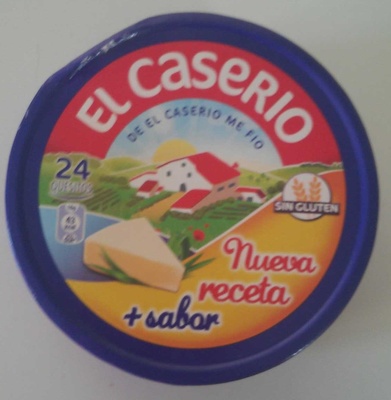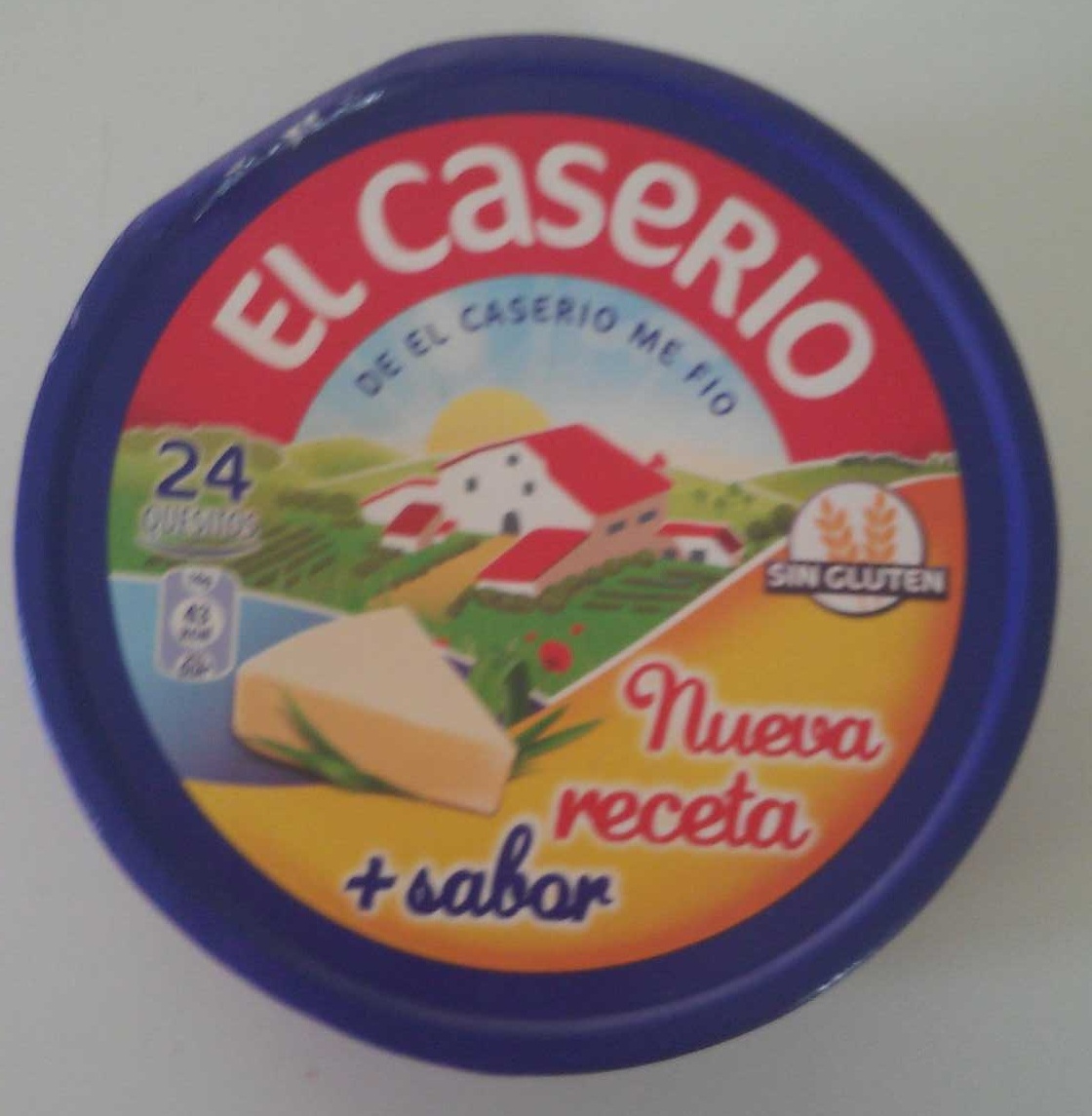Help us make food transparency the norm!
As a non-profit organization, we depend on your donations to continue informing consumers around the world about what they eat.
The food revolution starts with you!
El caserio - 24
El caserio - 24
This product page is not complete. You can help to complete it by editing it and adding more data from the photos we have, or by taking more photos using the app for Android or iPhone/iPad. Thank you!
×
Barcode: 7622210055828 (EAN / EAN-13)
Common name: Queso fundido
Quantity: 24
Packaging: Metal, Recyclable Metals, Aluminium, Container
Brands: El Caserio
Categories: Dairies, Fermented foods, Fermented milk products, Cheeses
Labels, certifications, awards:
Green Dot
Traceability code: BE FR 002 EC
Stores: Mercadona
Countries where sold: Spain
Matching with your preferences
Health
Ingredients
-
11 ingredients
: leche desnatada concentrada, queso, mantequilla, E452, E331,fosfatos de calcio, proteina de leche, sal, E330, E202, E234,Allergens: Milk
Food processing
-
Ultra processed foods
Elements that indicate the product is in the 4 - Ultra processed food and drink products group:
- Additive: E452 - Polyphosphates
- Ingredient: Milk proteins
Food products are classified into 4 groups according to their degree of processing:
- Unprocessed or minimally processed foods
- Processed culinary ingredients
- Processed foods
- Ultra processed foods
The determination of the group is based on the category of the product and on the ingredients it contains.
Additives
-
E202 - Potassium sorbate
Potassium sorbate (E202) is a synthetic food preservative commonly used to extend the shelf life of various food products.
It works by inhibiting the growth of molds, yeast, and some bacteria, preventing spoilage. When added to foods, it helps maintain their freshness and quality.
Some studies have shown that when combined with nitrites, potassium sorbate have genotoxic activity in vitro. However, potassium sorbate is generally recognized as safe (GRAS) by regulatory authorities.
-
E234 - Nisin
Nisin: Nisin is a polycyclic antibacterial peptide produced by the bacterium Lactococcus lactis that is used as a food preservative. It has 34 amino acid residues, including the uncommon amino acids lanthionine -Lan-, methyllanthionine -MeLan-, didehydroalanine -Dha-, and didehydroaminobutyric acid -Dhb-. These unusual amino acids are introduced by posttranslational modification of the precursor peptide. In these reactions a ribosomally synthesized 57-mer is converted to the final peptide. The unsaturated amino acids originate from serine and threonine, and the enzyme-catalysed addition of cysteine residues to the didehydro amino acids result in the multiple -5- thioether bridges. Subtilin and epidermin are related to nisin. All are members of a class of molecules known as lantibiotics. In the food industry, nisin is obtained from the culturing of L. lactis on natural substrates, such as milk or dextrose, and it is not chemically synthesized. It was originally isolated in the late 1930s, and produced since the 1950s as Nisaplin from naturally occurring sources by Aplin and Barrett in laboratories in Beaminster in Dorset, and approved as an additive for food use in the USA in the late 1960s, although the Beaminster factory now is owned by DuPont.Source: Wikipedia
-
E330 - Citric acid
Citric acid is a natural organic acid found in citrus fruits such as lemons, oranges, and limes.
It is widely used in the food industry as a flavor enhancer, acidulant, and preservative due to its tart and refreshing taste.
Citric acid is safe for consumption when used in moderation and is considered a generally recognized as safe (GRAS) food additive by regulatory agencies worldwide.
-
E331 - Sodium citrates
Sodium citrate: Sodium citrate may refer to any of the sodium salts of citrate -though most commonly the third-: Monosodium citrate Disodium citrate Trisodium citrateThe three forms of the salt are collectively known by the E number E331. Sodium citrates are used as acidity regulators in food and drinks, and also as emulsifiers for oils. They enable cheeses to melt without becoming greasy.Source: Wikipedia
Ingredients analysis
-
Palm oil free
No ingredients containing palm oil detected
-
Non-vegan
Non-vegan ingredients: Skimmed milk, Cheese, Butter, Milk proteins
-
Maybe vegetarian
Ingredients that may not be vegetarian: Cheese
-
Details of the analysis of the ingredients
: leche desnatada, queso, mantequilla, e452, e331, fosfatos de calcio, proteina de leche, sal, e330, e202, e234- leche desnatada -> en:skimmed-milk - vegan: no - vegetarian: yes - ciqual_proxy_food_code: 19051 - percent_min: 9.09090909090909 - percent_max: 100
- queso -> en:cheese - vegan: no - vegetarian: maybe - ciqual_proxy_food_code: 12999 - percent_min: 0 - percent_max: 50
- mantequilla -> en:butter - vegan: no - vegetarian: yes - ciqual_proxy_food_code: 16400 - percent_min: 0 - percent_max: 33.3333333333333
- e452 -> en:e452 - vegan: yes - vegetarian: yes - percent_min: 0 - percent_max: 25
- e331 -> en:e331 - vegan: yes - vegetarian: yes - percent_min: 0 - percent_max: 20
- fosfatos de calcio -> en:e341 - vegan: yes - vegetarian: yes - percent_min: 0 - percent_max: 16.6666666666667
- proteina de leche -> en:milk-proteins - vegan: no - vegetarian: yes - percent_min: 0 - percent_max: 14.2857142857143
- sal -> en:salt - vegan: yes - vegetarian: yes - ciqual_food_code: 11058 - percent_min: 0 - percent_max: 2.8
- e330 -> en:e330 - vegan: yes - vegetarian: yes - percent_min: 0 - percent_max: 2.8
- e202 -> en:e202 - vegan: yes - vegetarian: yes - percent_min: 0 - percent_max: 2.8
- e234 -> en:e234 - vegan: yes - vegetarian: yes - percent_min: 0 - percent_max: 2.8
Nutrition
-
Bad nutritional quality
⚠ ️Warning: the amount of fiber is not specified, their possible positive contribution to the grade could not be taken into account.⚠ ️Warning: the amount of fruits, vegetables and nuts is not specified on the label, it was estimated from the list of ingredients: 0This product is not considered a beverage for the calculation of the Nutri-Score.
Positive points: 5
- Proteins: 5 / 5 (value: 10, rounded value: 10)
- Fiber: 0 / 5 (value: 0, rounded value: 0)
- Fruits, vegetables, nuts, and colza/walnut/olive oils: 0 / 5 (value: 0, rounded value: 0)
Negative points: 24
- Energy: 3 / 10 (value: 1134, rounded value: 1134)
- Sugars: 1 / 10 (value: 5.6, rounded value: 5.6)
- Saturated fat: 10 / 10 (value: 14, rounded value: 14)
- Sodium: 10 / 10 (value: 1120, rounded value: 1120)
The points for proteins are counted because the product is in the cheeses category.
Nutritional score: (24 - 5)
Nutri-Score:
-
Nutrient levels
-
Fat in high quantity (22.5%)
What you need to know- A high consumption of fat, especially saturated fats, can raise cholesterol, which increases the risk of heart diseases.
Recommendation: Limit the consumption of fat and saturated fat- Choose products with lower fat and saturated fat content.
-
Saturated fat in high quantity (14%)
What you need to know- A high consumption of fat, especially saturated fats, can raise cholesterol, which increases the risk of heart diseases.
Recommendation: Limit the consumption of fat and saturated fat- Choose products with lower fat and saturated fat content.
-
Sugars in moderate quantity (5.6%)
What you need to know- A high consumption of sugar can cause weight gain and tooth decay. It also augments the risk of type 2 diabetes and cardio-vascular diseases.
Recommendation: Limit the consumption of sugar and sugary drinks- Sugary drinks (such as sodas, fruit beverages, and fruit juices and nectars) should be limited as much as possible (no more than 1 glass a day).
- Choose products with lower sugar content and reduce the consumption of products with added sugars.
-
Salt in high quantity (2.8%)
What you need to know- A high consumption of salt (or sodium) can cause raised blood pressure, which can increase the risk of heart disease and stroke.
- Many people who have high blood pressure do not know it, as there are often no symptoms.
- Most people consume too much salt (on average 9 to 12 grams per day), around twice the recommended maximum level of intake.
Recommendation: Limit the consumption of salt and salted food- Reduce the quantity of salt used when cooking, and don't salt again at the table.
- Limit the consumption of salty snacks and choose products with lower salt content.
-
-
Nutrition facts
Nutrition facts As sold
for 100 g / 100 mlCompared to: Cheeses Energy 1,134 kj
(271 kcal)-17% Fat 22.5 g -13% Saturated fat 14 g -16% Carbohydrates 5.6 g +187% Sugars 5.6 g +526% Fiber ? Proteins 10 g -51% Salt 2.8 g +93% Fruits‚ vegetables‚ nuts and rapeseed‚ walnut and olive oils (estimate from ingredients list analysis) 0 %
Environment
-
Eco-Score C - Moderate environmental impact
⚠ ️Select a country in order to include the full impact of transportation.The Eco-Score is an experimental score that summarizes the environmental impacts of food products.→ The Eco-Score was initially developped for France and it is being extended to other European countries. The Eco-Score formula is subject to change as it is regularly improved to make it more precise and better suited to each country.Life cycle analysis
-
Average impact of products of the same category: C (Score: 54/100)
Category: Camembert cheese, from cow's milk
Category: Camembert cheese, from cow's milk
- PEF environmental score: 0.50 (the lower the score, the lower the impact)
- including impact on climate change: 5.24 kg CO2 eq/kg of product
Stage Impact Agriculture
84.4 %Processing
5.6 %Packaging
4.4 %Transportation
3.3 %Distribution
1.8 %Consumption
0.5 %
Bonuses and maluses
-
Missing origins of ingredients information
Malus: -5
⚠ ️ The origins of the ingredients of this product are not indicated.
If they are indicated on the packaging, you can modify the product sheet and add them.
If you are the manufacturer of this product, you can send us the information with our free platform for producers.
-
Packaging with a low impact
Malus: -3
Shape Material Recycling Impact Unknown Heavy aluminium Recycle Medium ⚠ ️ The information about the packaging of this product is not sufficiently precise (exact shapes and materials of all components of the packaging).⚠ ️ For a more precise calculation of the Eco-Score, you can modify the product page and add them.
If you are the manufacturer of this product, you can send us the information with our free platform for producers.
Eco-Score for this product
-
Impact for this product: C (Score: 46/100)
Product: El caserio - 24
Life cycle analysis score: 54
Sum of bonuses and maluses: -8
Final score: 46/100
-
Carbon footprint
-
Equal to driving 2.7 km in a petrol car
524 g CO² per 100g of product
The carbon emission figure comes from ADEME's Agribalyse database, for the category: Camembert cheese, from cow's milk (Source: ADEME Agribalyse Database)
Stage Impact Agriculture
85.1 %Processing
5.0 %Packaging
5.0 %Transportation
4.0 %Distribution
0.7 %Consumption
0.1 %
Packaging
-
Packaging with a low impact
-
Packaging parts
(Aluminium)
-
Packaging materials
Material % Packaging weight Metal
-
Transportation
-
Origins of ingredients
Missing origins of ingredients information
⚠ ️ The origins of the ingredients of this product are not indicated.
If they are indicated on the packaging, you can modify the product sheet and add them.
If you are the manufacturer of this product, you can send us the information with our free platform for producers.Add the origins of ingredients for this product Add the origins of ingredients for this product
Report a problem
-
Incomplete or incorrect information?
Category, labels, ingredients, allergens, nutritional information, photos etc.
If the information does not match the information on the packaging, please complete or correct it. Open Food Facts is a collaborative database, and every contribution is useful for all.
Data sources
Product added on by malikele
Last edit of product page on by spotter.
Product page also edited by juanjo, kiliweb, musarana, packbot, yuka.UUxJK1FLRUNxS1FRbU1FeTdFM0t5TUFxMXFEMFhsanZjTlZMSVE9PQ.








